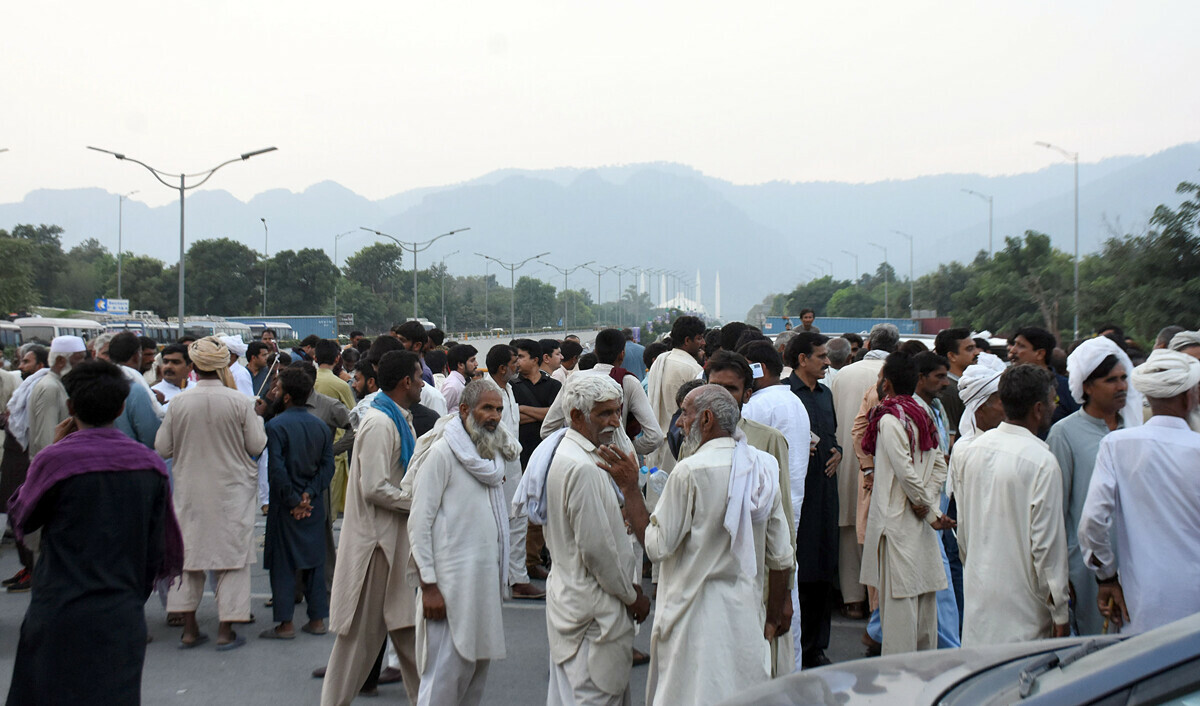ISLAMABAD: Farmers who had arrived in the capital on Wednesday to get their demands accepted have refused to budge from their stance, as the third round of negotiation between the government and the protesters ended in stalemate.
The Kissan Ittehad comprising farmers from across Punjab, has demanded the restoration of the previous tubewell electricity tariff of Rs5.3 per unit and the removal of taxes and adjustments among other things.
According to the farmers, Interior Minister Rana Sanaullah used ‘threatening language’ during the talks and told them that the government would not let the protesters move towards the Red Zone at any cost.
Talking to the reporters, the interior minister said a cabinet committee was working on the issue of reducing electricity bills for the agricultural tubewells. He added that the panel would meet again on Monday to examine the proposals in this regard.
Contingents of police, FC deployed to foil possible move towards Red Zone
Mr Sanaullah claimed the ‘genuine’ demands put forth by the farmers were being considered “very seriously”, adding that the demand for deferring the tubewell bills had already been accepted and a notification to this effect had already been issued. “There is no justification for the sit-in,” he said.
A representative of the Kissan Ittehad told reporters that the interior minister warned that the government would have no qualms using state machinery against the farmers which had already been mobilised in light of Pakistan Tehreek-i-Insaf’s (PTI) call for protest.
Meanwhile, farmers blamed the stalemate on the “rejection of their demands” by the administration.
They said they were unfettered by the minister’s threats and vowed to march towards the Red Zone if demands remained unmet.
Kissan Ittehad Chairman Khalid Batth said the minister’s tone was “different” during the meeting and that the government should forget about using force against the farmers.
“[In case negotiation fail] our next plan of action is to go to the Red Zone,” the chairman added. The minister sought time till Tuesday to fulfill the demands, he said, adding that “we are committed to continuing the protest till acceptance of our demands”.
Earlier, more groups of farmers joined the protesters at Khayaban Chowk, after reaching the capital from different parts of Punjab, including Okara, the officers said, adding that their number increased to about 3,000.
Security plan
Sources said the police and paramilitary personnel deployed in the Blue Area have been given instructions to remain alert to foil a possible march towards the Red Zone.
According to the police security plan, the Khayaban-i-Suhrawardi Road near Serena Hotel would be blocked with containers and barbed wire.
Two platoons of the Anti-Riot Unit (ARU) of the Frontier Corps (FC) comprising 25 personnel each were deployed near the hotel, the police official said, adding that two platoons were also deployed at Nadra Headquarters Chowk, also blocked with containers and barbed wires.
At least four ARU platoons were deployed at Express Chowk – blocked with barbed wire – along with armed personnel carriers equipped with anti-riot gears. A police platoon along with 18 personnel of ARU was deployed at Marriot Chowk, the officers said, adding that Margalla Road was also blocked at the ISI picket and 18 policemen were deployed there.
As many as 17 platoons of police, including four ARU platoons comprising 18 personnel each and six tear-gas teams comprising 18 officials, were deployed around Khayaban Chowk, the officers said, adding that water cannon vehicles and armed personnel carriers were also deployed. The Special Branch was directed to deploy officials among the protesters to gather intelligence, the officers added.
Similarly, the in-charge of the tear-gas store was also deployed in Sector G-8 with three vehicles loaded with 6,000 long-range and short-range shells and as many guns as available to the department. All the armed personnel carriers deployed at different locations were equipped with 500 each long-range and short-range tear gas shells.
Police officials said the security division of the capital police was also made responsible for the security of the Red Zone along with all the important installations, adding that the capital administration also requested to make arrangements for ambulances, paramedical staff, and fire engines.




